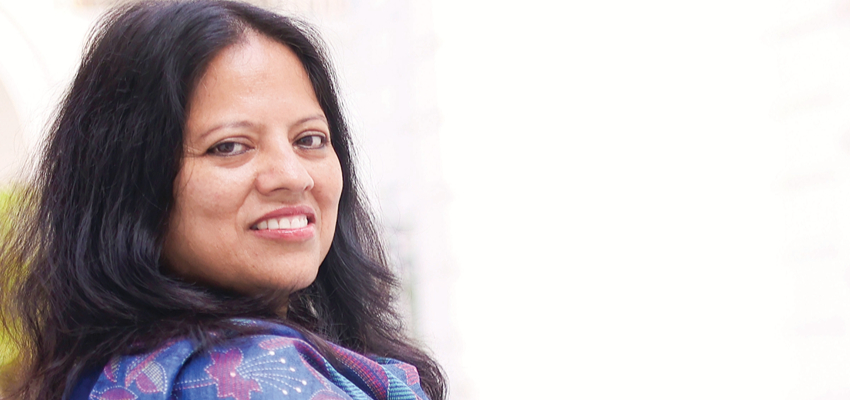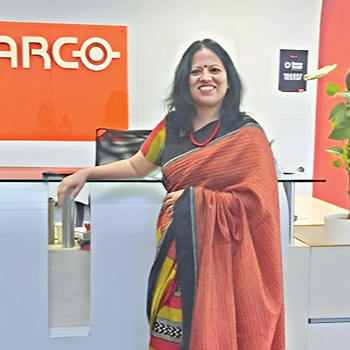From Command to Commerce

She wears many hats, but none weigh her down—if you think that meant leaving behind her sense of discipline, strategy, and duty—think again, Squadron Leader (Retd.) Dimple Rawat carries it all with her, like invisible wings. She left the Indian Air Force in 2009 to follow her corporate calling. As the Senior Director-HR at Barco, she balances a thriving corporate career with family life, personal passions, and a deep commitment to women’s empowerment. Her husband continues to serve in the Indian Air Force, while she based out of Delhi, shapes the civilian side of leadership. In this candid and wide-ranging conversation, Rawat opens up about switching sectors, owning her identity in male-dominated spaces, and how collaboration not competition is the trending note in the corporate world
"In the Air Force, our mission was to defend the country. It’s an institution of service, sacrifice, and protection. In the corporate sector, it’s more about strategy, growth, revenue, and long-term business goals"
-Dimple Rawat
Corporate Citizen: Let’s begin with the basics. You’ve seen both worlds—defence and corporate. What is similar and what is completely different?
Dimple Rawat: At a broad level, both are organisations with defined missions, systems, and structures. Both understand that people (human resources) are the real asset—that’s the one big similarity. However, once you go deeper, the differences emerge.
In the Air Force, our mission was to defend the country. It’s an institution of service, sacrifice and protection. In the corporate sector, it’s more about strategy, growth, revenue, and long-term business goals. The intent is different and the culture is different too. In the Air Force, we started work at 7am sharp. I’d be in the office by 6:45am and often wrap up by 2pm, but that didn’t mean the day was over. You’re always on duty—night rounds, weekend checks and readiness exercises. It was rigorous, but predictable in its own way.
When I moved to the corporate office, the 9am to 6pm culture felt like an adjustment. I missed the pace and discipline of my earlier life. What I missed even more was the kind of structured growth and training opportunities for women that the defence forces offer. In many ways, the Air Force prepared me professionally, better than an MBA would have.
CC: You were the only woman officer in a unit of 300 men. That’s not just rare, it’s historic. What was that experience like?
I was 23, leading a team of men, some as young as 18 and some in their mid-50s. Many had never reported to a woman before, let alone one in an uniform. It wasn’t just new for them, it was an uncharted territory for me too. Very early on, I realised one thing—wearing the rank on your sleeve doesn’t make you a leader, earning the team’s respect does.
I did what I knew best — showed up, did the work, stayed consistent. I was always the first to reach the office and the last to leave. I listened, I learned, and I led by example. I got involved in their tasks, made thoughtful decisions, and never asked someone to do what I wouldn’t do myself. Slowly, the resistance melted, and we became a unit.
Today, things are better. There are more facilities for women — separate washrooms and structured support systems. I still feel the transition zones, the in-between spaces, could be better. Not everything has evolved as much as it should.
"In a war scenario, a single miscommunication can cost lives. In business, it can cost deals, clients, or trust. I’m very conscious of how I communicate, especially during conflict or uncertainty"
CC: What were your most impactful moments in the Air Force?
As an engineer, I was trained in surface-to-air missiles. My job as Flight Commander of the Tech Flight involved managing missile systems, readiness protocols, equipment audits—you name it. Handling missile systems was complex and intense, and yes, I was part of both the 'Kargil War' and 'Operation Parakram'.
The other role was as Adjutant— essentially the HR Head for my unit. Back then, we didn’t call it HR, but that’s what it was—people management, conflict resolution and personnel planning. Looking back, both roles laid the foundation for the work, I do now. One taught me technical precision under pressure. The other taught me empathy, systems thinking and resource planning.
CC: You mentioned being part of the Kargil War. What leadership lessons came out of those high-stakes moments that you still use today in your corporate experience?

Many, but I’ll start with teamwork. When you’re preparing a missile for combat, no one person can do it alone. Different people work on different parts, and every action has to be precise. One missed detail could mean disaster. That level of coordination, that sense of shared responsibility is something I’ve carried into every corporate team I’ve led. Today at Barco, I manage a team of 10 people. My role isn’t to micromanage, it’s to inspire, align and support.
Then there’s communication—in a war scenario, a single miscommunication can cost lives. In business, it can cost deals, clients or trust. I’m very conscious of how I communicate, especially during conflict or uncertainty. Finally, leadership isn’t about titles. You may be the senior most person in the room, but if you don’t lead with humility and clarity, people won’t follow you. You have to earn it every day.
CC: Making the switch from uniform to corporate—have you prepared before the transition or did it come as a cultural shock?
I left the Air Force in 2009, and I’m so glad I took the Pre-Release Course (PRC) offered to exiting officers. I pursued it through IIM Calcutta. It gave me the language and context for the corporate world. One line from that course stuck with me: ‘You’re just changing your weapon. Now your weapon is communication and connection'. I still live by that.
Also, my engineering background helped. Barco is in the tech space, so my domain knowledge came in handy. Honestly though, more than skills it was the mindset that helped me succeed—clarity, discipline, and the ability to deal with uncertainty.
CC: How did your family take to the transition, since your husband also serves the Indian Air Force?
On the contrary, I owe everything to my father and my husband. They are my biggest supporters. When I left the Air Force, my husband was posted from Pune to Delhi. He was the one who told me, ‘You’ll figure this out. Just come.’ He did more than encourage me—he stepped up. He made the commute, helped with the kids, and kept the house running. That kind of silent partnership makes a huge difference and helped me in every career decision I made.
CC: Is there anything the defence could adopt from the corporate?
Flexibility, for sure. In the Air Force, multi-skilling is built into the system. You rotate jobs frequently. It’s still not easy to move across functions—say, from engineering to logistics. A little more flexibility and cross-skilling would go a long way.
Also, the support system for women needs strengthening. Imagine, if every Air Force station, had a functional crèche, maybe run by women from the station community. Officers could pay a nominal fee, and it would create jobs while solving a real problem. These small changes could have huge ripple effects.
CC: How do corporate employers respond to veterans, especially women veterans?
Very positively. In fact, veterans are increasingly seen as part of diversity hiring. We’re known for our discipline, loyalty and work ethics—companies trust us. I remember seeing Amazon India’s page featuring uniformed photos of veteran employees—they were being celebrated, not just hired.
It’s not just officers. The corporate world is beginning to appreciate what women veterans bring to the table—resilience, leadership, multitasking and mission focus.
"Leadership isn’t about titles. You may be the senior most person in the room, but if you don’t lead with humility and clarity, people won’t follow you. You have to earn it every day"
CC: Tell us about 'Women with Wings'. What’s the mission?

'Women with Wings' was started by Shaifaly Sangal, and I joined as an advisory board member. Today, we’re a group of over 100 women—HR professionals, L&D consultants, counsellors, entrepreneurs and authors. We don’t compete, we collaborate. The motto is ‘Every woman counts’. We support each other’s goals. Let’s say someone writes a book—we launch it as a community. Someone changes careers—we mentor them. It’s a sisterhood, but also a deeply professional network. I’ve seen first-hand how powerful women can be when they stop competing and start uplifting.
CC: For officers looking to make the switch, which corporate roles tend to be a natural fit?
It depends on their background. HR and admin are strong options, because defence officers are exceptional at people and resource management. If they’re from IT, cybersecurity is an obvious path. Many ex-officers move into sales—they’re persuasive, negotiate well, and understand human behaviour. The point is—if you’ve survived the defence forces, you can thrive anywhere.
CC: Do you miss donning the uniform, at times, since you know the different kind of respect and adventures that come with it?
I used to. But now, seeing my husband in uniform keeps that nostalgia alive. Once in a while, when I look at old photos, it hits me. That version of me—young, ambitious, fearless—is still here but just evolved. The corporate world has given me new challenges, and I’m grateful.
CC: What are the challenges and opportunities that you encountered as partners from the same field?
There’s a deep understanding that only comes from shared experience. We respect each other’s work. I remember him telling me once, ‘Don’t waste time cooking. Outsource what you can. Use your energy to grow’. That level of support is rare and invaluable.
CC: How do your children fit into this high-achieving household?
They’re busy! My eldest daughter is an engineering student and a tennis gold medallist. She’s won medals in squash and softball too. She has read over 300 books and has her own library. My younger daughter and son are into chess, swimming, karate and now one wants to learn dance. They’re curious, driven, and full of life.
As a working mother, I’ve had to be intentional with time, but it’s possible. With the right support, you can nurture a career and a family without giving either less than they deserve.